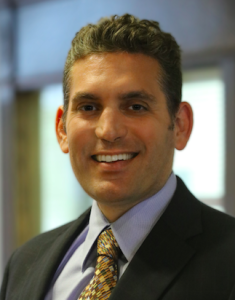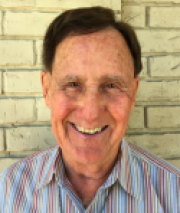Insurance Agency Owner
Mentor – Mark Tedford
 Mark is the co-owner of Tedford Insurance. Since Mark and his brother took over the agency in 2004, it has doubled in size. They now have over seventy employees with seven locations throughout Oklahoma as well an eighth location in Fort Worth, Texas.
Mark is the co-owner of Tedford Insurance. Since Mark and his brother took over the agency in 2004, it has doubled in size. They now have over seventy employees with seven locations throughout Oklahoma as well an eighth location in Fort Worth, Texas.
In his article, Mark talks about the labor shortage in the insurance business and the opportunities available for well-trained people. While there are classes that are important to take in high school and college, the specific training you need for a career in the insurance industry is done by the insurance companies themselves after you are hired. This makes it important to choose a company with a good training program if you decide to enter the business.
Mark also points out insurance is a business career where few people ever leave once they become established. Compensation tends to be higher than sales and administrative positions in many other industries. Compensation is high because there is a shortage of qualified people in the insurance industry and companies want to retain good people to protect the investment they have made in their training. Plus insurance revenue is generally predictable once your are established giving you a stable income compared to many other careers.
Mark’s article will be of interest to those of you who are looking for a career where you can be certain there will be good demand for qualified people for many years and want to know more about the kind of education and training you need to be successful in the insurance business. His article will also be of interest to anyone who wants to learn more about how insurance underwriting cycles and the State Insurance Commissioner affect insurance pricing.
Overview
Few people start out wanting to go into the insurance business after they graduate from high school. I was no different even though my father and mother started a Tulsa agency in 1978 and I knew something about the business. When I graduated from high school, I went to Missouri Southern University and my main interest was playing football. It took an injury my second year for me to begin to focus on what I was going to do to make money. After I graduated in 1992, I decided to go back to Tulsa and get an MBA at the University of Tulsa. I received that degree in 1994 while I worked part time for my father and then decided to work full time at the agency. My father died in 2007 and my older brother and I purchased my younger brother’s interest and began running the company as co-owners. We have doubled the size of the business in the last twelve years and now have seven locations in Oklahoma including Chandler, Claremore, Drumright, Jenks, McAlester, Muskogee and Oklahoma City as well as an eighth office in Fort Worth, Texas.
Our agency primarily handles different lines of business insurance with property and casualty policies making up seventy percent of our sales. The main challenge for growing our insurance business has been finding, training and then retaining good people. While a person needs to be outgoing to be able to sell, you also need to understand each customer’s business, which requires you know something about business law, accounting and banking. You also need specific training so you will understand the insurance markets. Like other insurance agencies, we do this training ourselves. We break our training program down into two areas. The first is technical training where new people learn about the different kinds of business risk, coverage and how to design an effective insurance program. The second is sales training where people learn how to sell commercial insurance products to businesses and how to build personal relationships that help retain our customers.
People starting out in our training programs begin as associates working with an experienced person in our company and also attend outside training seminars. It generally takes someone about three years to get the experience and training they need to work on their own in these positions. A lot of the people we have hired with college degrees think they should have more responsibility than we give them when they start. But there are a lot of things to learn about commercial lines of insurance college does not teach you including insurance coverages and how to evaluated business risk for companies in different industries. This is especially important for smaller agencies like ours. In very large companies, people tend to specialize and work with companies in a particular industry while we deal with companies in a wide variety of industries. This means our people must have broad business knowledge. But I think this broader business training gives an advantage to agencies like ours because our client base is very diversified. When one industry is not doing well, clients in other businesses help stabilize our revenue.
There are different kinds of positions in the insurance industry consider. You can gain technical expertise and work at servicing customers and designing insurance plans. These technical jobs are salaried. While you do not have to do that much selling, you do have to be able to communicate well with our customers and salespeople so you can design an effective insurance program and also be able to work with the insurance companies underwriting these policies. Sales positions in commercial insurance agencies are usually part salary and part commissions. While you have to learn how to sell and bring in new business, you must still have some technical knowledge to be able to evaluate your customer’s business and work with our technical people to design the right insurance program for your customers.
Besides technical and sales positions, we have a number of administrators who deal with things like customer claims and premium payments who often were secretaries or receptionists. Even though they also have to go though a period of training for about two years to become an effective administrator, we still pay these positions well in order to both attract and retain good people. We found we got better results when we paid higher than minimum wage for these kinds of administrative training positions and even for someone to be a good receptionist. We want all our people to present a good image of our company when they deal with our customers.
You should also understand there are a number of insurance designations and certifications you can get that will help you advance your career. As and example, I received certification as a professional insurance counselor and as an insurance risk manager. You can also get insurance industry certifications in other specialized areas like employee benefits. Keep in mind that the insurance industry is constantly changing and consequently you will go to classes on a regular basis to keep up with changes in the industry and maintain your certifications.
Another thing that is important to understand is how a local insurance company manages their own risk of loss in the reinsurance market. Reinsurance is basically insurance against large losses purchased by the local insurance underwriter. The reinsurance markets are designed to have the capacity to accept large, unexpected losses from events like tornados, hurricanes and earthquakes or large losses from things like product recalls or class action consumer liability suits. As an example of how reinsurance is priced and how if affects the pricing of insurance for our customers, lets assume the local insurance company where we place a policy decides to accept the first $500,000 of loss and then sells the risk of loss for anything over that amount to a reinsurance company. In markets where there have not been large losses for several years, the local company may only have to give up a small amount of the premium to cover themselves against a catastrophic loss. For this example, lets say that number is 10% of the premium. But if a large loss does occur from something like a hurricane or a series of tornados, the next year it could cost 25% of the premium or more and the reinsurance company could require that the local insurance company accept the first million dollars of risk rather than just $500,000. This in turn will cause the local insurance company to raise their premiums to our customers. The randomness of these kinds of large losses means insurance pricing goes through cycles where insurance premiums can actually drop if large losses haven’t occurred for several years. During these times, both the primary and reinsurance companies build up their loss reserves so that these companies are earning money from the investment of their reserves in stocks and bonds and can lower premiums each year few losses occur. When a series of large losses does occur, insurance premiums rise the next year so that both primary and reinsurance companies can rebuild their reserves and restore their capacity to underwrite insurance. For an insurance agency like ours, losing a few customers because of the increasing cost of insurance during one of these cycles is usually offset by the higher premiums we collect from those who we retain, which helps stabilize our income.
An Insurance Commissioner sets insurance rates in each state. In Oklahoma, this is an elected position. But in other states the Commissioner can be appointed. Insurance companies submit rate applications and justifications for those rates to the Commissioner who then reviews them and issues rate guidelines. While an Insurance Commissioner is an advocate for the State’s citizens and businesses, the Commissioner also needs to make sure that insurance rates are high enough to attract insurance companies and keep them writing policies in the state. If too many leave, the State’s economy will suffer. So the Commissioner has to balance the need for the insurance companies to make a profit and the desire of the citizens and businesses purchasing insurance to get the lowest price.
How to Prepare for a Career in the Insurance Industry
- It is important that you have an outgoing personality and know how to communicate with people both orally and in writing. While you are in high school, take English courses where you learn to write well and classes like speech, debate, and theater or get involved in student government where you get experience speaking in front of people. You will also need to take math to be able to prepare yourself to learn business analysis.
- When you get to college, take basic business courses like accounting, business law and banking regardless of your major.
- Either a Bachelors or even an Associates degree in business can be helpful with Marketing being the most useful major based on my experience observing successful people in the insurance business.
- Because you are trained to sell and service specific types of policies by the insurance company after you are hired, look around at the types of training programs offered by these companies before you apply for a position just like you would choosing a school.
- Many insurance companies offer internship programs. These are useful because they will give you practical experience that will help you decide if it is a business you like before you get involved in a training program.
- Learn about the certifications and licenses you will need to achieve your income goals and what coursework you will have to complete to receive those certifications.
Summary
Although a career in the insurance industry is something most people don’t usually consider out of high school, there are a lot of advantages to these jobs once you are established including stable incomes and good pay. There is also the opportunity if you are in commissioned sales to be entrepreneurial and build your book of business and earnings and even start your own agency. My experience has been that once someone has been in the insurance business for three years or more and is successful, they seldom leave. I would encourage anyone who is outgoing, has good written and oral communication skills and can do business analysis to consider commercial insurance as a career.
US Bureau of Labor Statistics for Insurance Underwriters.
Underwriters are the main link between an insurance company and the insurance agent. They take specific information about a client and enter it into a computer program that provides recommendations on coverage and premiums.
The median annual wage for insurance underwriters was $64,220 in May 2014. The median wage is the wage at which half the workers in an occupation earned more than that amount and half earned less. The lowest 10 percent earned less than $39,260, and the highest 10 percent earned more than $113,010.
In May 2014, the median annual wages for insurance underwriters in the top industries in which they worked were as follows:
Health and medical insurance $64,290
Direct Insurance except life and health $63,700
Insurance Agencies and Brokerages $61,680
US Bureau of Labor Statistics Insurance Sales Agents
The median annual wage for insurance sales agents for all types of insurance was $47,860 in May 2014. The median wage is the wage at which half the workers in an occupation earned more than that amount and half earned less. The lowest 10 percent earned less than $25,710, and the highest 10 percent earned more than $119,970.
Many independent agents are paid by commission only. Sales workers who are employees of an agency or an insurance carrier may be paid in one of three ways: salary only, salary plus commission, or salary







